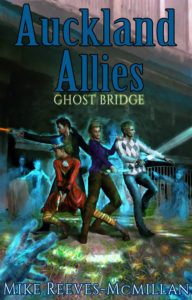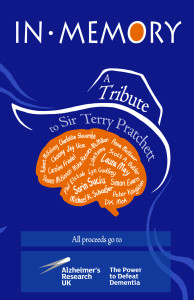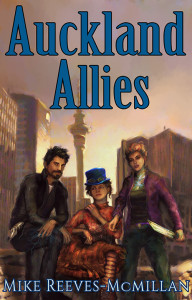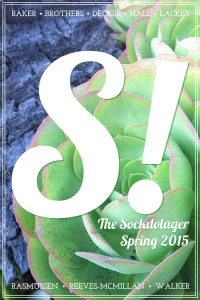I recently participated in a thread on Google+ started by someone who was arguing for leaving self-publishing in favour of trad pub. Now, I’m not sure if he’s genuinely naive or just trolling, but his view of trad pub is, let’s say, rosier than the facts justify.
I’ve set out my views on traditional publishing before, but to summarise: the main remaining benefits of traditional publishing that I can see are wider exposure, including print distribution to bookstores, and some residual (and rapidly vanishing) extra credibility.
The two are intertwined. There are many podcasts, book review sites and the like which still only feature traditionally-published books and authors, often as a matter of explicitly stated policy, and the underlying reason is presumably that this gives them a straightforward filter to reduce the amount of crap coming across the transom. A high-profile site of this kind gets inundated with far more material than they can handle, and saying “no self-pub” reduces the volume by filtering out material that, additionally, is still statistically more likely to be of low quality.
The quality issue in self-pub is real, but things are shifting rapidly. As clueless trad-pub houses get rid of editors and savvy self-publishers take them on, the quality gap is shrinking. I have “shelves” (tags) set up on Goodreads for “needs-editing”, “seriously-needs-editing” and “well-edited”. At time of writing, I have 20 books marked “seriously-needs-editing,” of which 5 are from large publishers and one from a small press (the rest are indie). I have 39 marked “well-edited,” of which 33 are from indies. Now, disclaimers: I read a disproportionate amount of indie fiction, I’m pretty good at filtering out the bad ones, and out of those 33 well-edited books, 15 are by Debora Geary, who just doesn’t seem to put many typos in or else has an incredibly eagle-eyed editor. Regardless, the quality gap is smaller than it’s often portrayed, and as more and more of the most imaginative work is done in self-pub, the credibility gap will shrink.
Not only in editing, either. I occasionally browse the cover designs that Joel Friedlander features on his Book Designer website (link is to a post featuring a couple of my covers), and at a casual inspection, it looks to me as if they are getting much better than they used to be. Indies are aware now that they can’t stick a hideous cover on their book and expect it to do well. Trad-pub, on the other hand, can still put out cliched and awful covers sometimes. One of the reasons I choose to publish independently is exactly this: in trad-pub, the author is stuck with whatever cover the publisher comes up with, good or bad, even if it’s a terrible representation of their vision or undermines one of their main points. If that happens with one of my covers, I only have myself to blame, because I commission them and approve them.
As for print distribution, the value of that is shrinking rapidly, and Hugh Howey’s analysis shows that it isn’t financially beneficial overall (at least, not for the authors). It gets more eyes on your stuff, which is important in awards season, but it doesn’t get you more money if you publish with a traditional publisher who gives you low ebook royalties and print distribution to bookstores, vs getting higher ebook royalties and no print distribution. (In fact, if you publish through CreateSpace you can buy an add-on that gets you print distribution to bookstores, though whether it is worthwhile is another question – the answer will vary depending on the individual book, but my sense is that on average it is “no” unless you’re doing well already.)
The average traditionally-published genre book will have a couple of copies sent to each bookstore, where they will be displayed “spine-out” on a shelf in that genre’s section of the store for a limited period of time (3-6 months, I believe), after which they will probably be returned for a credit if nobody has bought them. That kind of exposure is increasingly not worth signing over lifetime rights to a publisher in exchange for low royalties.
I do have a point, which I’ll get to soon
I’m rehearsing these well-rehearsed thoughts (which many have stated before me) not so much for their own sake as in order to give background for my main point, which is this: there is another, backdoor way to get some of the “gatekeeper cred” and exposure that traditional publishing still, for the moment, grants.
If I did the submission dance and was fortunate enough to be one of the comparative few given a trad-pub contract – and I’m reasonably confident that I could eventually achieve that if it was a goal of mine – I would face four problems which are reasons I don’t participate in that dance (apart from the tedium of the dance itself).
The first problem is timeliness. From submission to acceptance to publication is a long and winding road in trad-pub. That’s time in which my work could potentially be earning me money, and in which I could be getting reaction to it which could influence the next thing I write.
The second problem is control. I’d have no control over the cover, no control over the price, no control over the blurb, and the final editorial decisions would not be mine. Now, you can argue whether my retention of that control produces a better or worse result. I think it produces a better result, but I do know this for sure: my preference is to have it.
The third problem is scope of rights. Under the usual traditional contract, my rights in that work – and possibly other subsequent works – would be severely restricted, and the publishers would effectively control them for what amounts to an unlimited period (from my perspective, anyway, since copyright freedom 70 years after my death does me no good). The problem here is not that the publishers have the right to publish the work – that’s what they’re buying, after all – but that they retain it indefinitely.
The fourth problem, of course, is earning potential, and anything I could say about that is covered much better at Authorearnings.
The Answer
So what’s the answer? How can I get the benefits of trad-pub (exposure and perceived legitimacy) without the drawbacks I’ve just enumerated?
The answer is short stories.
There still remains a vigorous, and if anything increasing, market for short stories, especially genre, especially fantasy and science fiction. There are anthologies coming out all the time, and numerous magazines, not to mention many competitions. There are different kinds of markets; some pay only royalties, others a token upfront amount, but many pay an upfront per-word rate ranging from 0.5c to 25c. Professional rates are considered (by fiat of the SFWA) 6c/word, and according to The Submission Grinder, there are currently 35 pro-paying markets for SF and 29 for fantasy (many of them, of course, the same markets).
Now, nobody’s going to get rich just selling short stories for 6c/word. But what the short story markets provide is a more flexible, more timely, less rights-grabby version of trad pub.
Anthologies, even from small presses, get reviewed in places that are closed to indies. The major short story magazines (and there are several) are highly regarded in the field. Short stories get on awards ballots; there’s a special place for them in several of the major awards. And all these markets have editors, so you can prove that someone other than you thought your fiction was worth publishing.
At the same time, their turnaround is relatively quick – few take as long as three months, much faster than the query process for traditional book publishing, and then publication usually follows in short order. That solves the problem of timeliness. (Exception: tor.com, a short fiction market which is owned by a book publisher, has a notoriously slow turnaround).
In terms of control, I don’t expect control over the cover of an anthology or magazine that includes my story among several others. I hope it’s not awful, and usually it isn’t, but nobody else thinks of it as representing me either, so if it is awful, the splashover onto me is minimal and people will believe me when I distance myself from it.
Scope of rights is something that short story markets mostly make very clear upfront. Usually, their submission guidelines will say something like, “We’re buying first serial rights with an exclusive period of X”. X can vary from zero (you’re free to use it elsewhere as soon as it’s published) to a year, rarely more, and seems to average about 30-90 days. Anthologies usually have a longer exclusivity period than magazines, since magazines have a faster churn time – once the next issue is out, they’re usually not worried about someone republishing a story that was in the last one. Anthologies are either one-off or annual, and in either case often call for a one-year exclusive.
And once that period is up, your rights revert, and you can try to sell the story to another publication (though not many take reprints, and those that do often pay less for them than they do for first appearances). Or you can put it on Amazon, alone or in a collection, and people can buy it from you there. (You might, if you’re lucky, get into a Best Of anthology of some kind, though some of those primarily pay in exposure.)
And that’s the earning potential issue addressed. Sell your story to the highest-paying market you can (knowing in advance how much you’ll get), potentially resell it to another market afterwards, then stick it in Kindle Direct Publishing and make some more money from it. You’re not stuck earning 25% royalty while the publisher cleans up for the rest of your life. You can rewrite it, turn it into a novel, collect it, whatever you like, because you have your rights back.

- Kanaka Menehune / Foter / Creative Commons Attribution-NonCommercial 2.0 Generic (CC BY-NC 2.0)
I’ve got a collection coming out soon, in fact, from HDWP Books, including several stories I’ve published with them or elsewhere before, as well as some new ones. I joke in the back of the book that this makes me a “hybrid” author, though not like a Prius – more of a moped.
This, along with the good things it’s doing for my practice of the craft of writing, is why I’m working on short stories a lot these days. I’ve placed one in New Realm magazine (royalty-only, and I haven’t hit the threshold for a payout, nor do I seriously expect to – but it’s a publication credit, and the story is mine again now); three in the Theme-Thologies from HDWP Books (again, royalty-only, and I’ve had one small payout so far); and I just the other day got the news that I’ve sold one to the Alternate Hilarities 3: Hysterical Realms funny-fantasy anthology, which is another step up the ladder. There’s an upfront payment (at least 1c/word, and up to 8c/word depending on how their Kickstarter goes) and a share of royalties.
I have five or six more stories on submission and several more that I’m working on. My plan is to work my way up through the semi-prozines and semi-pro anthologies to the big time: Strange Horizons, Sword and Sorceress, Unidentified Funny Objects (to name three that have sent me encouraging emails saying they wished they could buy my stories but they weren’t quite right for this time).
All the street cred of traditional publication, without the lifetime rights grab and the long delays. More like being a contractor than being a low-level employee. This is how publication ought to work.









